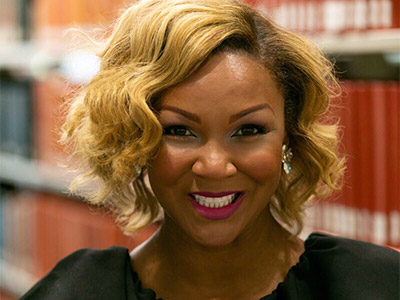Now Ordained, Kimberly Gonxhe Leads Ecumenical Urban Initiatives at Pittsburgh Seminary
“I accepted my call to the ministry at the age of 14,” says Pittsburgh Seminary’s Director of the Metro-Urban Institute Kimberly Gonxhe. “But as with much of the rest of my life, my path to ordination has been non-traditional,” she adds. The Rev. Gonxhe, ordained Baptist last month, has always worked across denominational boundaries in conducting ecumenical ministry “under the sole banner of Jesus Christ.” And having earlier in her life served a Baptist congregation as a minister, Kimberly is now finding that her official ordination opens new opportunities for expanded Christian service.
“When I was a teenager, peers would come to me for counsel about particular problems. I served as a kind of peer chaplain in junior and senior high, and then into college. I have preached in churches, led worship, and worked with ordained pastors across many denominations since my early twenties. I’ve been viewed as a peer in ministry, but now that I’ve fulfilled the rigorous requirements for ordination, I am able to join ministeriums and work more effectively with pastors as an official member of the clergy,” Kimberly explains.
Through these avenues, her ordination expands opportunities for students enrolled in the MUI Fellowship program, for example—a relatively new initiative in which several PTS students each year are placed in internships that foster their becoming part of the fabric of the local community. “The Fellows enrich our on-campus community by bringing their broader experiences into the classroom, and the local community is encouraged by the Fellows’ involvement and advocacy in their behalf—by seeing Christ followers at PTS in action,” Kimberly notes.
Kimberly feels that her call is not to a particular congregation; rather, it remains as director of MUI at Pittsburgh Seminary. “As with my ecumenical ordination council—made up of Baptists, Presbyterians, and African Methodist Episcopalians—my ministry is one of service with followers of Christ regardless of their church tradition. It includes Protestants, Catholics, Americans, Ugandans, urbanites, villagers, and more—the wide range of people naming Jesus Christ as Lord,” Kimberly notes. Her service of ordination at Pittsburgh’s New Bethel Baptist Church exemplified that diversity by incorporating women and men representing a variety of denominations.
This fall, Kimberly’s extensive ministry throughout Pittsburgh was well recognized through her receipt of the Pittsburgh Circle of Courage Award in the area of education. The awards, given since 2011, honor and encourage “individuals who have displayed faith and courage in their careers, ministries, and other aspects of life,” often by going beyond the call of duty, and “making a difference” in the community. (To pursue her call to ministry full time, Kimberly gave up a thriving, 10-year engineering career with a Fortune 100 Company.) Proceeds from the awards ceremony itself benefit BCC Ministries, an organization that provides food and clothing for the poor on the North Side of Pittsburgh, educational opportunities for children and adults, and support for global ministries.
In addition to her directing MUI at Pittsburgh Seminary, Kimberly continues to serve as a long-standing board trustee for the Pittsburgh Leadership Foundation; founding executive director of the Live Foundation (a global gender justice organization); vice president for the Samburu Girls Foundation U.S. Board of Directors; member of the Pennsylvania Global Advisory Committee for the U.S. Global Leadership Coalition; advisory council member for the Larimer Consensus Group; and executive advisory council member for The Forbes Funds.

